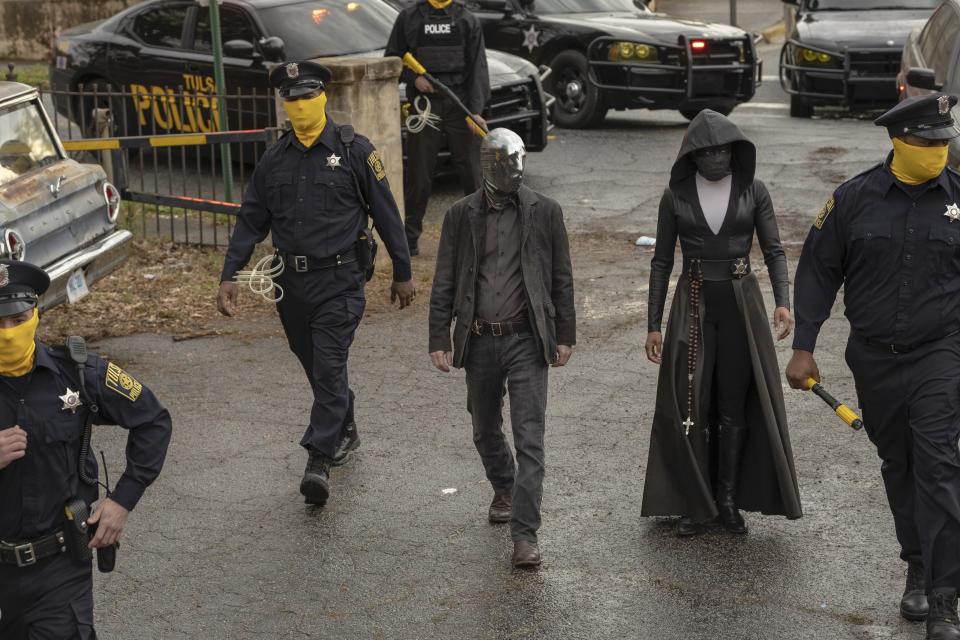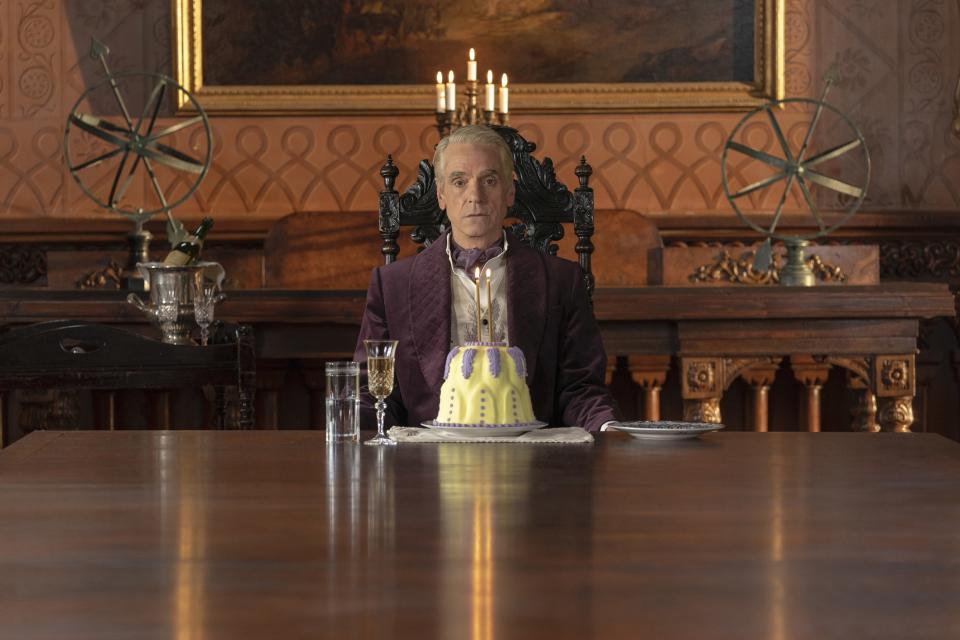Watchmen : A Beginner’s Guide
We’re less than a week away from the premiere of Watchmen, a dark, buzzy new superhero series that HBO hopes will help to fill the new Game of Thrones-sized hole in its lineup of dramas. But despite the title, the new series isn’t an adaptation of the legendary comic of the same name. Instead, it’s a kind of sequel, revisiting the same universe (and a few of the same characters) in 2019 to tell an all-new story.
I’m not going to spoil any of the new stuff in the HBO series—but viewers who tune in with no context for Watchmen will almost certainly be baffled by some of the series’ more eccentric elements. For better or worse, HBO’s Watchmen assumes a lot of knowledge about the original series.
But it’s not like every HBO subscriber got a free copy of the graphic novel in the mail last month. So where should you begin? If you’ve never read Watchmen (or just need a refresher on it), this is everything you’ll need to know ahead of Sunday night:
I want to be ready for Watchmen. What do I need to do first?
If you have some extra time on your hands this week, here’s the easy answer: Go read the comic. Watchmen was originally published over 12 issues, which have since been collected into the graphic novel format. The collected series is more than 400 pages long—and it’s pretty dense reading—but it’s widely regarded as one of the best comics ever written, so it shouldn’t be too much of a chore.
But if you really don’t want to read the comic, you could also check out Watchmen: The Complete Motion Comic, a panel-by-panel adaptation that’s sort of like a cross between an audiobook and an animated series. It’ll take you six hours, but it’ll definitely bring you up to speed.
And in theory, the comic (or the motion comic) should give you all the context you need for the HBO series. In the months leading up to the show’s release, series creator Damon Lindelof has repeatedly asserted that everything that happens in the Watchmen comic is 100 percent canon to the TV show. "Everything that happened in those 12 issues could not be messed with," he said at the Television Critics Association press tour over the summer.
Look: This show premieres in less than a week. Can you just tell me the important stuff?
This is gonna get weird—but I’ll do my best. (And obviously, the rest of this article will spoil most of the original comic.)
Let’s start with the basics. Watchmen is set in an alternate-universe version of 1985. In this timeline, Richard Nixon never resigned the presidency. In fact, he rode a wave of massive popularity—repealing the 22nd amendment and serving more than two terms as president—after the United States won the Vietnam War and turned Vietnam into the 51st state of the union.

How did that happen?
Because the United States military relied on the might of Doctor Manhattan, a blue-skinned superhero whose powers are so all-encompassing that he’s less like Superman and more like a god. (Doctor Manhattan is one of several original Watchmen comic characters confirmed to return in the HBO series.)
So what’s his deal?
Before he was a terrifyingly powerful superhero, Doctor Manhattan was Jon Osterman, a regular guy working as a nuclear physicist. After a freak accident, he was transformed into a glowing, blue-skinned superhero. For a solid rundown of Doctor Manhattan’s origin story, check out this clip (which happens to be one of the best sequences from director Zack Snyder’s big-budget 2009 Watchmen adaptation—more on that in a minute):
Doctor Manhattan’s allegiance to the United States made the country into an even bigger global superpower. But it also turned up the heat on the Cold War. As Watchmen begins, the United States and the Soviet Union are teetering on the brink of global nuclear war—and when Doctor Manhattan abandons Earth for a life of self-imposed solitude Mars, leaving the United States newly vulnerable to a nuclear attack.
This is already getting complicated. Wasn’t there a movie? Should I just watch that?
It’s an option. (I, for one, think the movie is better than its reputation or cultural footprint might suggest.) And while Snyder streamlines parts of the comic, it’s mostly pretty faithful to the source material—so most of what you see in the movie will also be canon for the HBO series.
Alright, I’m going to rent the movie. See you later!
Wait! If you’re going to go that route, you need to decide which version to rent. There are three: the Theatrical Cut, the Director’s Cut, and the Ultimate Cut, which clocks in at a whopping 215 minutes. Ordinarily, I’d recommend the Director’s Cut—but annoyingly enough, it’s not available to stream anywhere right now. Unless you want to go really deep, the Theatrical Cut should be fine.
But whichever version you track down: If you’re going to watch the movie in preparation for the HBO series, there’s at least one big difference between the comic and the movie you should know about.
(Again: Big spoilers for both the comic and the movie adaptation below!)
At the climax of the movie, Doctor Manhattan is framed for a horrifying attack that levels New York City, killing millions of people. That’s not how it goes down in original. In the comic, the attack that levels New York City appears to have been caused—but was not actually caused—by a giant alien squid that slips through a trans-dimensional portal.
Come again?
I warned you this was going to get weird! The "alien attack"—and the implication that the Earth might be in more danger from an extraterrestrial force—is enough to scare both the United States and the Soviet Union away from the brink of nuclear apocalypse, banding together against a greater alien threat.
Which, as it turns out, was the goal all along. Because the "alien attack" was actually an elaborate hoax engineered by a billionaire businessman and philanthropist named Adrian Veidt—also known as Ozymandias—who will be played by Jeremy Irons in the HBO series.

The comic begins with a series of mysteries, and eventually reveals that Adrian Veidt is the culprit behind most of them. Before the events of the comic, Veidt had analyzed the geopolitical landscape and concluded that the United States and Soviet Union were on a path that would lead to the destruction of the entire world. So he secretly used his vast resources to fake the alien attack, concluding that the millions of people who died in New York were a necessary sacrifice for the greater good. And whether you agree with Veidt’s method or not, it worked.
Okay. So who knows the real story?
At the end of the comic, just a handful of Veidt’s former allies, whom he knew when he was moonlighting as a costumed vigilante. (In the Watchmen universe, only Doctor Manhattan actually has superpowers—the rest of the story’s "superheroes" are just regular people who have, for one reason or another, decided to put on costumes and fight crime.)
In addition to Doctor Manhattan, they are:
1. Dan Dreiberg (a.k.a. Nite Owl II), a somewhat nerdy, gadget-loving hero who has gone to seed following his forced retirement in 1977. It’s unknown if he’ll appear in the HBO series.
2. Laurie Juspeczyk (a.k.a. Silk Spectre II), the daughter of a famous superhero, who begins the comic in a relationship with Doctor Manhattan and ends the comic in a relationship with Dan Dreiberg. She also discovers that The Comedian, a sadistic crimefighter/government agent who once attempted to rape her mother, is her real father. In the HBO series, she’ll be played by Jean Smart.

3. Walter Kovacs (a.k.a. Rorschach), a violent moral absolutist who wears a mask with constantly shifting inkblots on it. When Rorschach vows to expose the truth behind the "alien attack," he is killed by Doctor Manhattan in the name of preserving world peace. But before his death, Rorschach delivers his journal to a right-wing publication called The New Frontiersman, which could theoretically have exposed the truth. (The comic ends without revealing whether or not the contents of Rorschach’s journal ever reach the greater public.) I’m not going to spoil how Rorschach factors into the HBO series—but you should definitely know who he is, and what his deal was.
And these people were all superheroes?
For a little while! But not during the actual comic. Watchmen depicts real-life superheroes as a kind of fad that began in the 1940s with a group called The Minutemen (which included Laurie’s mother, Dan’s mentor, and The Comedian).
After a public outcry following a violent 1977 riot in which some "superheroes" were involved, independent costumed vigilantes were formally outlawed by congressional order. Doctor Manhattan and The Comedian went on to work for the U.S. government. Rorschach defied the order, evading police as he continued to operate outside the law. Everybody else retired, and Adrian Veidt is the only one who revealed his secret identity to the public.
Okay. Is that everything that happens in Watchmen?
Nope! Like I said: It’s pretty dense. But as far as I’ve seen, that’s everything you’ll need to know to understand the HBO series.
What else am I missing?
In addition to all the plot stuff I just described, there are little details and easter eggs that will make way more sense if you’re familiar with the comic. Part of the fun of Watchmen is the density and complexity of the world-building, and tracking all the little ways the Watchmen universe deviates from our own. That philosophy has clearly carried over into the HBO series, which is packed with little details only fans of the comic will notice.
Let’s say I really get into Watchmen. Anything else I need to know?
Within the past decade, there have been a bunch of attempts to expand the Watchmen universe beyond those original 12 issues. There are a bunch of comic-book prequels collected under the mantle Before Watchmen, a beat-em-up video game, and a recent run of comics in which characters from the Watchmen universe crossed over with D.C. Comics heroes like Batman and Superman.
But if you want my opinion: The best of that stuff is unnecessary, and the worst is straight-up horrible. And all of it was made against the wishes of writer Alan Moore, a reclusive and somewhat curmudgeonly figure who has expressed either disinterest or firm opposition in any attempt to adapt Watchmen or expand its story beyond those original 12 issues. (For the record, that includes the new TV series, which HBO executive Casey Bloys concedes Moore is "not thrilled" about.)
Wherever you decide to go next: Watchmen offers a weird, complicated, and fascinating alternate universe to dig into. To date, none of the comic’s adaptation or spinoffs have come close to equalling it—but hope springs eternal that the new HBO series has finally cracked it.
Originally Appeared on GQ

